|
|
|
Sort Order |
|
|
|
Items / Page
|
|
|
|
|
|
|
| Srl | Item |
| 1 |
ID:
126723
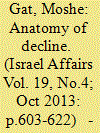

|
|
|
|
|
| Publication |
2013.
|
| Summary/Abstract |
Following the Suez Campaign the British government found itself facing Moscow and its bid for power in the Middle East. The Soviets, for their part, exploited London's weakness to extend and consolidate their influence in the Arab world. By taking advantage of the Arab-Israeli conflict, by maintaining an (un)reasonably high level of regional tension, Moscow sought to make the Arabs totally dependent on its support. It began supplying the Arabs with weapons and providing them with diplomatic support, acquiring in the process a regional status equal to that enjoyed by the West. This in turn meant that any attempt by Britain to come to some kind of an understanding, such as limiting arms sales to the Middle East, had virtually no chance of success. Having mobilized what little remained of its power to try and check the Soviet advance, Britain was finally forced admit that it was no longer up to the task.
|
|
|
|
|
|
|
|
|
|
|
|
|
|
|
|
| 2 |
ID:
053182


|
|
|
| 3 |
ID:
178879
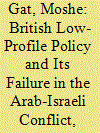

|
|
|
|
|
| Summary/Abstract |
Following the Suez Campaign in October 1956, Great Britain began to step away from the Middle East. Its policy aimed at a gradual withdrawal from the region while protecting its interests, ensuring the uninterrupted supply of oil, and curbing Soviet expansion. Hence the policy of the United Kingdom (UK) was to maintain stability as another war between Israel and its Arab neighbors would be detrimental to its economy and provide the Soviet Union with the opportunity to deepen its incursion into the region. Britain therefore adopted a low-profile policy, designed to avoid taking sides in the Arab-Israeli conflict. In practice, it was burying its head in the sand. The Arabs viewed the absence of clear support for them, particularly in the issue of water, as implicit support for Israel, especially since Britain was secretly supplying the latter with weapons. London’s low-profile policy did not stand the test of regional developments. The tension between Israel and Egypt that emerged in mid-May 1967, intensified over the closing of the Straits of Tiran by Egypt, led the UK to take steps to ensure free passage through them.
|
|
|
|
|
|
|
|
|
|
|
|
|
|
|
|
| 4 |
ID:
171047
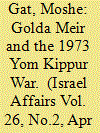

|
|
|
|
|
| Summary/Abstract |
Most historians blame Israeli Prime Minister Golda Meir for the outbreak of the 1973 Yom Kippur War, having allegedly rejected all peace proposals made by Egyptian President Anwar Sadat. In fact, Sadat was adamantly opposed to Meir’s demand for direct negotiations, envisaging political settlement as an American dictate on Israel. The Yom Kippur War shook both sides of their intransigence and brought them closer to each other’s position.
|
|
|
|
|
|
|
|
|
|
|
|
|
|
|
|
| 5 |
ID:
066608
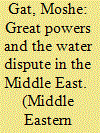

|
|
|
| 6 |
ID:
158148
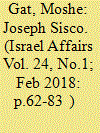

|
|
|
|
|
| Summary/Abstract |
Between 1969 and 1971 US diplomat Joseph Sisco was the driving force behind all initial steps to resolve the Israeli‒Egyptian conflict. But despite his tremendous efforts, his ability was limited as President Nixon did not throw his weight behind these efforts. Three main initiatives were taken during the discussed period: the Rogers Plan, the Rogers Initiative, and Sadat’s initiative for an interim agreement. Most of Sisco’s efforts concentrated on the latter initiative. His failure to reach an interim agreement, coupled with his inability to persuade Israel and Egypt to accept the Rogers Plan, led the region to political stagnation, from which the two parties only emerged in the aftermath of 1973 Yom Kippur War.
|
|
|
|
|
|
|
|
|
|
|
|
|
|
|
|
| 7 |
ID:
143620


|
|
|
|
|
| Summary/Abstract |
Between 1967 and 1973, Israeli governments took no initiative to set a peace process in motion. Instead, they simply responded to proposals that were raised from time to time, and, for the most part, rejected all of them – the Rogers Plan, Sadat’s willingness to sign a peace agreement and his initiative for an interim settlement – with the sole exception being the ceasefire agreement reached in August 1970. While Israeli policy lacked initiative on the political front, it dedicated much effort to convincing the United States that the greater Israel’s military power, the better its deterrence capabilities would be, which in turn would increase the likelihood of achieving peace. Hence, Israeli leaders’ repeated requests to be supplied with advanced aircraft.
|
|
|
|
|
|
|
|
|
|
|
|
|
|
|
|
| 8 |
ID:
166768
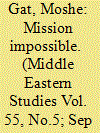

|
|
|
|
|
| Summary/Abstract |
Since entering office, William Rogers had undertaken to advance the peace process between Israel and the Arab states, particularly Egypt. He believed an agreement would serve the American interests at a time when extremism was spreading in the Arab world, and Soviet influence had grown. However, his actions on the political front went unsupported by President Nixon. Moreover, the National Security Advisor had embraced a different policy vis à vis Israel and the Arab world. Rogers' failure to secure an interim agreement and his previous failure to persuade Israel and Egypt to accept his plan, led the entire region back to stagnation, from which it emerged only after the October 1973 Yom Kippur War.
|
|
|
|
|
|
|
|
|
|
|
|
|
|
|
|
| 9 |
ID:
069914


|
|
|
|
|
|
|
|